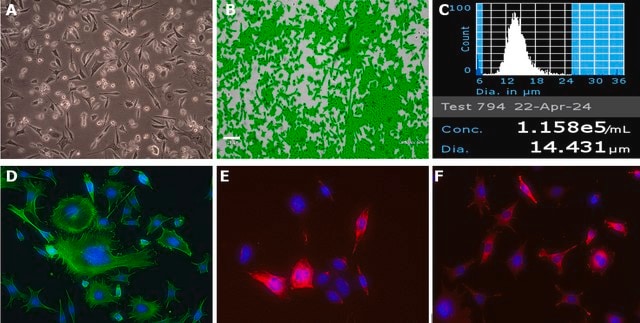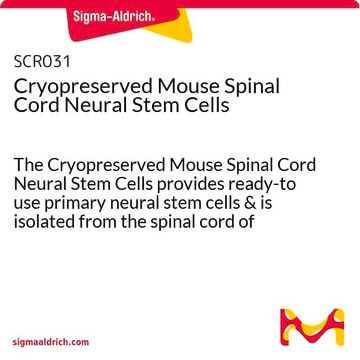SCR019
Neural Stem Cell Marker Characterization Kit
The Neural Stem Cell Characterization Kit contains two molecular markers, Nestin & Sox 2 that are frequently used to identify neural stem/progenitor cells.
Sign Into View Organizational & Contract Pricing
All Photos(5)
About This Item
UNSPSC Code:
12161503
eCl@ss:
32161000
NACRES:
NA.84
Recommended Products
Quality Level
manufacturer/tradename
Chemicon®
technique(s)
cell culture | stem cell: suitable
immunocytochemistry: suitable
input
sample type neural stem cell(s)
shipped in
dry ice
General description
Neural Stem Cell Marker Characterization Kit
Introduction:
Neural stem cells are present in both the developing and adult nervous system of all mammals, including humans (Gage, 2000). They possess the remarkable capacity to self-renew and to differentiate along specific pathways to generate the vast array of neuronal and glial cell types of the central nervous system (CNS). Due to their therapeutic promise, considerable attention has been focused on identifying the sources of stem cells, the signals that regulate their proliferation and the specification of neural stem cells towards more differentiated cell lineages.
Presently, neural stem cells are often identified based upon the presence of molecular markers that are correlated with the stem and/or progenitor state along with the absence of a more differentiated phenotype as assessed through marker analysis. To aid researchers in the accurate identification of neural stem cells, CHEMICON® presents the Neural Stem Cell Characterization Kit (Catalog Number SCR019).
CHEMICON′s Neural Stem Cell Characterization Kit (Catalog Number SCR019) contains two molecular markers, Nestin (Lendahl, U. et al., 1990) and Sox 2 (Graham, V. et al., 2003), that are frequently used to identify neural stem/progenitor cells along with more differentiated lineage markers including Map2ab for neurons, GFAP for astrocytes and O1 for oligodendrocytes. Mouse and rabbit immunoglobulins for the assessment of background staining are also included.
All of the antibodies provided in the kit have been tested and optimized for use in immunocytochemistry on adult rat neural stem cells. We recommend that CHEMICON′s Neural Stem Cell Characterization Kit be used in conjunction with differentiation assays that demonstrate multipotentiality of the starting cell population. Please look for these differentiation assays along with rat neural stem cells from CHEMICON in the near future.
For Research Use Only; not for use in diagnostic procedure.
Introduction:
Neural stem cells are present in both the developing and adult nervous system of all mammals, including humans (Gage, 2000). They possess the remarkable capacity to self-renew and to differentiate along specific pathways to generate the vast array of neuronal and glial cell types of the central nervous system (CNS). Due to their therapeutic promise, considerable attention has been focused on identifying the sources of stem cells, the signals that regulate their proliferation and the specification of neural stem cells towards more differentiated cell lineages.
Presently, neural stem cells are often identified based upon the presence of molecular markers that are correlated with the stem and/or progenitor state along with the absence of a more differentiated phenotype as assessed through marker analysis. To aid researchers in the accurate identification of neural stem cells, CHEMICON® presents the Neural Stem Cell Characterization Kit (Catalog Number SCR019).
CHEMICON′s Neural Stem Cell Characterization Kit (Catalog Number SCR019) contains two molecular markers, Nestin (Lendahl, U. et al., 1990) and Sox 2 (Graham, V. et al., 2003), that are frequently used to identify neural stem/progenitor cells along with more differentiated lineage markers including Map2ab for neurons, GFAP for astrocytes and O1 for oligodendrocytes. Mouse and rabbit immunoglobulins for the assessment of background staining are also included.
All of the antibodies provided in the kit have been tested and optimized for use in immunocytochemistry on adult rat neural stem cells. We recommend that CHEMICON′s Neural Stem Cell Characterization Kit be used in conjunction with differentiation assays that demonstrate multipotentiality of the starting cell population. Please look for these differentiation assays along with rat neural stem cells from CHEMICON in the near future.
For Research Use Only; not for use in diagnostic procedure.
Application
Research Category
Stem Cell Research
Stem Cell Research
The Neural Stem Cell Characterization Kit contains two molecular markers, Nestin & Sox 2 that are frequently used to identify neural stem/progenitor cells.
Components
Mouse anti-Nestin: (Catalog No. 2003602) One vial containing 50 μg monoclonal antibody. Store at 2° to 8°C.
Rabbit anti-Sox 2: (Catalog No. 2003600) One vial containing 20 μg affinity purified polyclonal antibody. Store at 2° to 8°C.
Mouse anti-MAP-2: (Catalog No. MAB3418-50UG) One vial containing 50 μg monoclonal antibody. Store at 2° to 8°C.
Rabbit anti-GFAP: (Catalog No. AB5804) One vial containing 50 μL of polyclonal rabbit serum. Store at -20 °C.
Mouse anti-Oligodendrocyte marker O1: (Catalog No. 2003601) One vial containing 20 μg IgM monoclonal antibody. Store at-20 °C.
Mouse IgM: (Catalog No. 2003599) One vial containing 50 μg purified mouse IgM control antibody. Store at 2° to 8°C.
Mouse IgG: (Catalog No. PP54-100UG) One vial containing 100 μg purified mouse IgG control antibody. Store at -20 °C.
Rabbit IgG: (Catalog No. PP64-100UG) One vial containing 100 μg purified rabbit IgG antibody. Store at -20 °C.
Rabbit anti-Sox 2: (Catalog No. 2003600) One vial containing 20 μg affinity purified polyclonal antibody. Store at 2° to 8°C.
Mouse anti-MAP-2: (Catalog No. MAB3418-50UG) One vial containing 50 μg monoclonal antibody. Store at 2° to 8°C.
Rabbit anti-GFAP: (Catalog No. AB5804) One vial containing 50 μL of polyclonal rabbit serum. Store at -20 °C.
Mouse anti-Oligodendrocyte marker O1: (Catalog No. 2003601) One vial containing 20 μg IgM monoclonal antibody. Store at-20 °C.
Mouse IgM: (Catalog No. 2003599) One vial containing 50 μg purified mouse IgM control antibody. Store at 2° to 8°C.
Mouse IgG: (Catalog No. PP54-100UG) One vial containing 100 μg purified mouse IgG control antibody. Store at -20 °C.
Rabbit IgG: (Catalog No. PP64-100UG) One vial containing 100 μg purified rabbit IgG antibody. Store at -20 °C.
Storage and Stability
When stored at the recommended storage conditions (refer to Kit Components), components are stable up to the expiration date. Do not expose to elevated temperatures. Discard any remaining reagents after the expiration date.
Legal Information
CHEMICON is a registered trademark of Merck KGaA, Darmstadt, Germany
Disclaimer
Unless otherwise stated in our catalog or other company documentation accompanying the product(s), our products are intended for research use only and are not to be used for any other purpose, which includes but is not limited to, unauthorized commercial uses, in vitro diagnostic uses, ex vivo or in vivo therapeutic uses or any type of consumption or application to humans or animals.
Storage Class
10 - Combustible liquids
Certificates of Analysis (COA)
Search for Certificates of Analysis (COA) by entering the products Lot/Batch Number. Lot and Batch Numbers can be found on a product’s label following the words ‘Lot’ or ‘Batch’.
Already Own This Product?
Find documentation for the products that you have recently purchased in the Document Library.
U Lendahl et al.
Cell, 60(4), 585-595 (1990-02-23)
Multipotential CNS stem cells receive and implement instructions governing differentiation to diverse neuronal and glial fates. Exploration of the mechanisms generating the many cell types of the brain depends crucially on markers identifying the stem cell state. We describe a
Esther Rheinbay et al.
Cell reports, 3(5), 1567-1579 (2013-05-28)
Glioblastoma (GBM) is thought to be driven by a subpopulation of cancer stem cells (CSCs) that self-renew and recapitulate tumor heterogeneity yet remain poorly understood. Here, we present a comparative analysis of chromatin state in GBM CSCs that reveals widespread
Our team of scientists has experience in all areas of research including Life Science, Material Science, Chemical Synthesis, Chromatography, Analytical and many others.
Contact Technical Service






